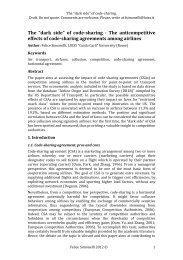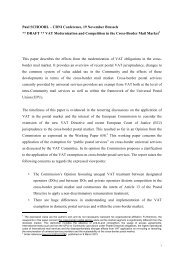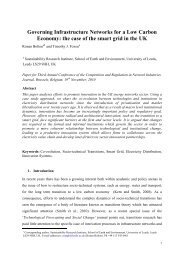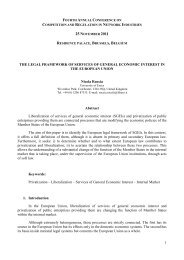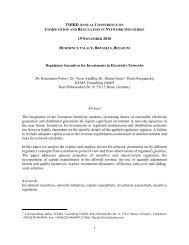Non-discriminatory Third Party Access to the Gas Transmission ...
Non-discriminatory Third Party Access to the Gas Transmission ...
Non-discriminatory Third Party Access to the Gas Transmission ...
Create successful ePaper yourself
Turn your PDF publications into a flip-book with our unique Google optimized e-Paper software.
Objective of this study<br />
Article 13 (1b) <strong>Third</strong> <strong>Gas</strong> Directive 1 (TGD) requires <strong>the</strong> opera<strong>to</strong>r(s) of <strong>the</strong> national <strong>Transmission</strong><br />
System of <strong>Gas</strong> (TSOs) <strong>to</strong> refrain from discriminating amongst <strong>the</strong> users of <strong>the</strong> transmission<br />
system (system users 2 ) and classes of system users, particularly in favour of its related<br />
undertakings. Article 14 (1a) Second <strong>Gas</strong> Regulation 3 (SGR) more or less repeats this rule. It<br />
requires TSOs <strong>to</strong> offer TPA services <strong>to</strong> all network users 4 . For <strong>the</strong> purpose of this study, both<br />
requirements fall, within <strong>the</strong> concept of non-<strong>discrimina<strong>to</strong>ry</strong> third party access (TPA). In this<br />
study non-<strong>discrimina<strong>to</strong>ry</strong> TPA is described as:<br />
The TSOs obligation <strong>to</strong> refrain from discriminating amongst system users/network users (who are<br />
ei<strong>the</strong>r seeking -or have gained- access <strong>to</strong> <strong>the</strong> transmission system) in <strong>the</strong> terms and conditions of<br />
services offered or provided.<br />
The two primary questions of this study are: (1) what is meant by discrimination in <strong>the</strong> context of<br />
Article 13 (1b) TGD and Article 14 (1a) SGR and (2) does a TSO act contrary <strong>to</strong> <strong>the</strong> TGD and<br />
<strong>the</strong> SGR if it treats system users/network users differently, based on <strong>the</strong>ir creditworthiness The<br />
choice <strong>to</strong> focus on creditworthiness was primarily inspired by <strong>the</strong> fact that most TSOs asses <strong>the</strong><br />
creditworthiness of system users by which <strong>the</strong>y conclude agreements. If <strong>the</strong> system user is<br />
insufficient in his creditworthiness, TSOs may refuse <strong>to</strong> provide TPA services or require<br />
* Ph.D.-Researcher at <strong>the</strong> University of Groningen and staff member of <strong>the</strong> Groningen Centre of Energy Law. My<br />
research focuses on <strong>the</strong> content and application of <strong>the</strong> principle of non-discrimination contained in EU gas law.<br />
Article 13 (1b) <strong>Third</strong> <strong>Gas</strong> Directive requires <strong>Transmission</strong> System Opera<strong>to</strong>rs (TSOs) <strong>to</strong> refrain from discriminating<br />
between users of <strong>the</strong> transmission system. I examine how TSOs in <strong>the</strong> Ne<strong>the</strong>rlands, Germany and <strong>the</strong> United<br />
Kingdom carry out this obligation and what <strong>the</strong> implications are. The question whe<strong>the</strong>r or not discrimination between<br />
system users can be justified is an important part of my research. Within <strong>the</strong> context of my PHD research, this<br />
contribution <strong>to</strong> <strong>the</strong> third annual conference of CRNI belongs <strong>to</strong> that series of studies I perform <strong>to</strong> clarify whe<strong>the</strong>r or<br />
not TSOs are allowed <strong>to</strong> discriminate between system users and <strong>to</strong> what extent. Thanks <strong>to</strong> Hans Vedder, Martha<br />
Roggenkamp, Marijn Holwerda, Nichola Cho and Erik Gottschal for <strong>the</strong> helpful suggestions; <strong>the</strong> usual disclaimer<br />
applies. Thanks also <strong>to</strong> De Nederlandse Vereniging voor Energierecht, Energy Delta Institute and NV Nederlandse<br />
<strong>Gas</strong>unie for providing me with <strong>the</strong> opportunity <strong>to</strong> conduct research on this <strong>to</strong>pic.<br />
1 Directive 2009/73/EC of <strong>the</strong> European Parliament and <strong>the</strong> Council of 12 July 2009 concerning common rules for<br />
<strong>the</strong> internal market in natural gas.<br />
2 Ibid, at Article 2 (23) is worded as follows: ‘system user’ means a natural or legal person supplying <strong>to</strong> or being<br />
supplied by, <strong>the</strong> system. In this context, also see Article 2 (1.13): ‘system’ refers <strong>to</strong> transmission networks owned<br />
and/or operated by a natural gas undertaking, including linepack and its facilities supplying ancillary services and<br />
those of related undertakings necessary for providing access <strong>to</strong> transmission.<br />
3 Regulation 715/2009 of <strong>the</strong> European Parliament and <strong>the</strong> Council of 28 September 2005 on conditions for access <strong>to</strong><br />
<strong>the</strong> natural gas transmission networks.<br />
4 Ibid, at Article 2 (11), is worded as follows: ‘network user’ means a cus<strong>to</strong>mer or a potential cus<strong>to</strong>mer of a TSO, and<br />
TSOs <strong>the</strong>mselves in so far as it is necessary for <strong>the</strong>m <strong>to</strong> carry out <strong>the</strong>ir functions in relation <strong>to</strong> transmission. The<br />
terms ‘system users’ and ‘network users’ are used interchangeably in this study. Network users and system users are<br />
persons (mostly undertakings) who are ei<strong>the</strong>r seeking, or have gained, access <strong>to</strong> <strong>the</strong> transmission network.<br />
2



